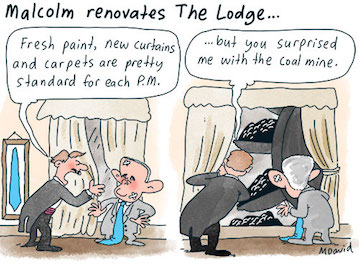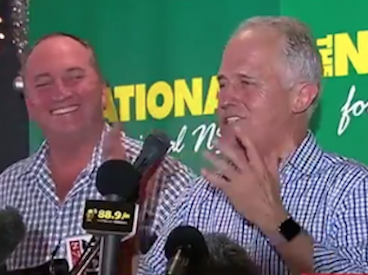The citizenship case in the High Court this week provides a fascinating insight into the overlap of media, politics, law and justice, says Ingrid Matthews.
TIS A WEEK awash with constitutional law experts and anyone can play. Just kidding. I am not a constitutional scholar, but I do teach jurisprudence and do research on media coverage of politics and law. The current constitutional case provides some fascinating insights into the intersection of media and politics, law and justice.
Courts decide cases by applying the law to the facts. The questions of fact currently before the High Court are whether each of seven politicians were ‘under any acknowledgment of allegiance, obedience, or adherence to a foreign power, or is a subject or a citizen or entitled to the rights or privileges of a subject or a citizen of a foreign power’ at the relevant time. The question of law is whether those MPs are thereby disqualified from election to the Australian parliament. The relevant law is s. 44(i) of the Australian Constitution. The facts are the birth and heritage status of the seven politicians, which vary considerably.
THE POLITICS OF LAW AND FACT
It is fair to say that fewer media organisations have specialist law reporters these days. It is also understandable, given the potential disqualification of six senators and a deputy prime minister, that political reporters are leading with this story (when not turning disproportionate attention to a Coalition backbencher).
Additionally, politics and law can not be disaggregated — politicians make laws, after all. Nor is the High Court entirely separate to politics. The Commonwealth is a frequent litigant and the Court regularly rules on whether Attorneys General – Commonwealth, state, territory – may join with a party before the court, on policy or other grounds (this is my favourite, which I comment on here).
But political reporters do not necessarily parse "policy grounds" accurately. In law, policy-based decisions are when the judiciary not only retrospectively apply the law to the facts, but also take into account the prospective socio-legal impacts of a decision. Although often labelled judicial activism, with derogatory implications, this is a wholly legitimate approach.
Onlookers are on the edge of their seats, anticipating the potentially explosive outcome of the High Court citizenship case. @PhoebeBowden pic.twitter.com/qeC37wPek6
— TEN Eyewitness News (@channeltennews) October 11, 2017
Principles of common law allow judges to consider socio-political impacts of assigning fault, or striking down legislation. Otherwise, we would see legalistic stasis. The law moves slowly – look how long it took to reject terra nullius – but move it can and does, and must.
Judicial decisions derive from judicial interpretation of statutes and case law. The judges are hedged in by rules and principles (common law doctrine), but they still exercise independence and discretion. This is why there are majority and dissenting decisions in appellate courts. Without judicial independence, every full bench decision would be unanimous and appellate courts would be redundant (a famous illustration here). In sum, their honours can legitimately turn their minds to the consequences of finding MPs to be disqualified from the Australian Parliament.
CASE STRATEGY
Another entry point for the broader politics of this matter is case strategy, which lawyers design to optimise the prospects for their clients. It may involve seeking separate trials for co-accused, or grouping multiple offences in one hearing. Perceptions are formed as to what might be advantageous to which party. These decisions have bearing on outcomes, from admissibility of evidence, to cost and delay.
In the case at hand, the Government strategy is found in the submissions of the Attorney-General and reflected in the arguments of the Solicitor-General. Again, this is wholly legitimate. Even Government lawyers act in the best interests of their client.
On Tuesday, for instance, Mr Solicitor argued that Ms Waters is in a similar position to Mr Canavan. Both were born to Australian parents and became eligible for citizenship of a foreign power by operation of foreign laws. The factual claim is that both turned their mind to whether to activate the eligibility and decided against. The legal question is whether the High Court "gives effect" to foreign laws by disqualifying Canavan and Waters due to their "passive" eligibility.
Anne Twomey: The High Court is not 'terribly keen' on the idea of subjectivity in determining citizenship. MORE: https://t.co/7utAtMYfou pic.twitter.com/qxTodVgWbw
— Sky News Australia (@SkyNewsAust) October 11, 2017
In the real world, Waters resigned from the Senate and expressed an interest in re-nominating. Canavan stepped aside from his Ministry but not from Parliament. Like Waters, Scott Ludlum was born overseas and resigned, but he ruled out a return to politics. Canavan was born in Australia and has foreshadowed an exit from politics. (Nobody cares what happens to Malcolm Roberts).
Their circumstances vary substantially, up to and including being born in Australia (Canavan) or not (Waters). Yet the Government has chosen to group Canavan with Waters, against her own position that she is disqualified, which is a specific decision with a specific purpose. This is case strategy.
REPORTING POLITICS, LAW AND JUSTICE
There are two other general points to make about the media framing of this case.
The first is the oft-foreshadowed possibility that those MPs who have not done so may be "forced to resign". This is supremely irritating, because no force is involved (unlike, say, how police handled a child here). Any resignation would be a function of the MP failing to comply with our Constitution and of the High Court doing its job.
The absence of force is important, because the biggest claim that common law liberal democracies like Australia make for our system is this: legal and political conflicts are settled in a "civilised" manner. With words, not fists. With elections, not coups. Using evidence and argument, not violence and vigilantism.
The rituals of legal process are imbued with this pretension to courteous resolution. But that is not how the law looks to Black people in prison cells and their families. Or to welfare recipients sent AFP-branded debt notices by Centrelink. We pay Barnaby Joyce over $1 million per three-year term, and thousands more in expenses, while aggressively pursuing the poorest people in society for petty or non-existent offences and debts.
The barrister for Tony Windsor has argued Barnaby Joyce's New Zealand heritage should disqualify him from Parliament. @CUhlmann #9News pic.twitter.com/AsnRjFsEK6
— Nine News Australia (@9NewsAUS) October 11, 2017
This is not justice.
Similarly, the notion that the "High Court could bring down the Government" is erroneous. If Joyce is disqualified, it would be a product of Joyce’s oversight and not because the High Court exercised some previously unrealised prerogative power in a curial coup. Plus, there are five crossbenchers in the Lower House. The member for Indi will support the Government on confidence and supply. Thus a shift from a majority to a minority government does not "bring down a government". Such a narrative is misleading and frankly embarrassing, given we had a minority government a mere four years ago.
In my view, if Joyce could discover and renounce New Zealand citizenship in 2017, he could have done so in 2004 when he nominated for the Senate, or in 2013 for the seat of New England (Wiki history here). This position is based in law and morality. To me it is simply wrong of Joyce to not ensure his eligibility to sit in the Australian Parliament when he receives such enormous largesse from the Australian public to do so. I say largesse because I can not see any value-add to the national interest, any return on our investment, in Joyce and his travels.
So yes, the politics of this case are fascinating, but not necessarily in the ways that are offered up by political reporters. Constitutional law is a serious business, and the law is not a game.
Ingrid Matthews is a sessional academic who teaches law and human rights. You can follow Ingrid on Twitter at @iMusing or via her blog oecomuse.
I'm not convinced of this. The subsequent steps taken by MPs could go to the reasonable steps each could have taken before nomination pic.twitter.com/FNvCj452b5
— Ingrid ️ (@iMusing) October 10, 2017

This work is licensed under a Creative Commons Attribution-NonCommercial-NoDerivs 3.0 Australia License
Monthly Donation
Single Donation
Public Malcolm and Kiwi Barnaby's perplexing Pilliga purchase: It's a gas! By Ingrid Matthews / @iMusing https://t.co/ccg74fDCQn
— IndependentAustralia (@independentaus) September 27, 2017
Subscribe to IA. It's independently Australian.











